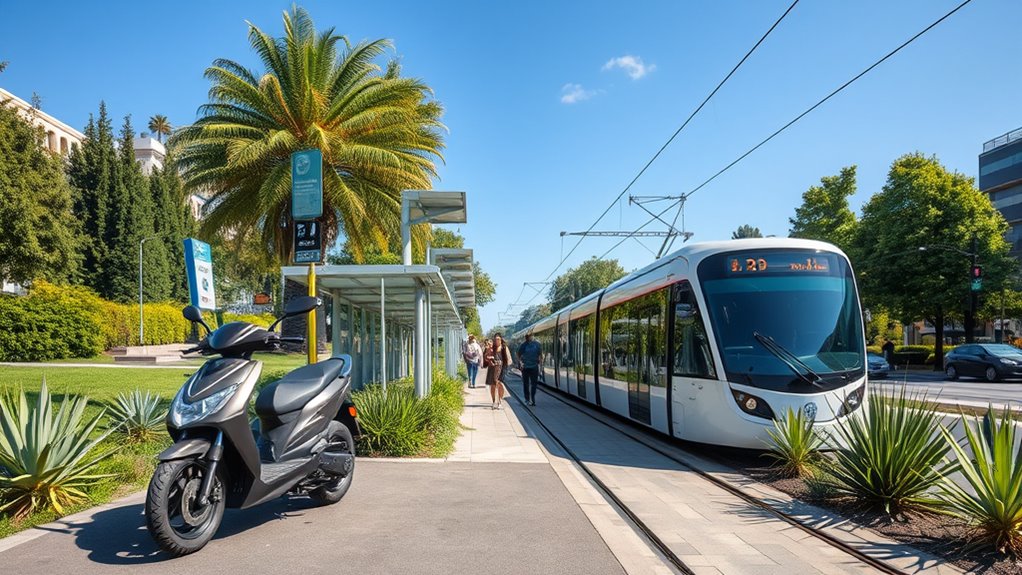To travel responsibly, you should plan ahead by learning about local customs, traditions, and environmental practices. Minimize your impact by choosing eco-friendly transportation, reducing waste with reusable items, and supporting local businesses. Respect cultural norms and be mindful of community well-being. Leave natural sites pristine and support sustainable efforts. By following these steps, you’ll guarantee your journey benefits both the environment and local communities—discover more ways to make a positive difference along the way.
Key Takeaways
- Respect local cultures by learning customs, dress codes, and engaging thoughtfully with traditions.
- Minimize environmental impact by choosing eco-friendly transportation and accommodations that prioritize sustainability.
- Reduce waste by carrying reusable items, avoiding single-use plastics, and practicing Leave No Trace principles.
- Support local communities by dining at local eateries, shopping at artisan markets, and purchasing handmade crafts.
- Be a responsible traveler by staying on designated trails, disposing of waste properly, and respecting wildlife and natural sites.
Plan and Research Your Destination Carefully

How well do you know your travel destination before you arrive? Doing thorough research helps you appreciate local cuisine and avoid surprises. Look into traditional dishes, food customs, and dining etiquette to respect local culture. This understanding can also enhance your experience by allowing you to discover local flavors and culinary traditions. It not only enriches your experience but also supports local businesses. Don’t forget to review travel insurance options that cover medical emergencies or unexpected trip cancellations. Knowing what’s included gives you peace of mind and helps you avoid costly mistakes. Planning ahead ensures you’re prepared for the environment, customs, and safety concerns. By understanding these details, you make responsible choices that benefit both you and the community. Being informed allows you to travel thoughtfully, fostering positive interactions and minimizing your environmental footprint.
Minimize Your Environmental Impact

You can lessen your environmental impact by choosing eco-friendly transportation options like trains or bikes instead of cars or planes. Remember to carry reusable items to cut down on single-use plastics, and pick accommodations that prioritize sustainability. Small changes like these make a big difference for the planet. Using water-efficient toilets in your accommodations can further reduce your water footprint during travel.
Choose Eco-Friendly Transportation
Opting for eco-friendly transportation options is one of the most effective ways to reduce your environmental footprint while traveling. Consider using electric vehicles, which produce zero emissions and are increasingly affordable. You can also participate in carbon offsetting programs to counteract your travel-related emissions. To make smarter choices, compare your options:
| Transportation Method | Environmental Impact |
|---|---|
| Electric Vehicles | Low emissions, renewable energy |
| Public Transit | Reduces per-person carbon footprint |
| Biking or Walking | Zero emissions, healthy |
| Car Rentals with Offsetting | Neutralizes emissions with offsets |
| Flights (if necessary) | Highest impact; offset when possible |
Choosing these options helps you travel responsibly, making a positive difference for the planet. Incorporating sustainable transportation practices can further enhance your eco-friendly travel efforts.
Reduce Single-Use Items
Did you know that single-use items are among the biggest contributors to environmental waste during travel? To reduce your impact, carry reusable packaging for snacks and drinks. Instead of disposable bottles or containers, opt for a durable water bottle and refill it often. Bring biodegradable utensils when eating on the go to cut down on plastic waste. These eco-friendly alternatives help you minimize trash that ends up in landfills and oceans. Small changes, like refusing plastic straws or using reusable bags, make a big difference over time. By consciously choosing sustainable options, you support the environment and encourage others to follow suit. Remember, your mindful choices during travel can have a lasting positive impact on the planet. Incorporating reusable utensils into your travel kit can further reduce reliance on disposable items.
Support Sustainable Accommodations
Supporting sustainable accommodations is a essential step in minimizing your environmental impact while traveling. Choose lodgings that prioritize eco-friendly bedding, which reduces water and energy use, and promotes better sustainability. Look for places that incorporate solar-powered amenities, such as solar water heaters or lighting, to lessen reliance on fossil fuels. These features not only lower the carbon footprint but also demonstrate a commitment to environmental responsibility. By staying in eco-conscious accommodations, you support businesses that prioritize sustainability and conservation. Additionally, many eco-friendly hotels implement waste reduction strategies and use environmentally friendly products. Your choice can make a significant difference, encouraging more establishments to adopt sustainable practices. Embracing renewable energy sources in accommodations further reduces greenhouse gas emissions and supports a cleaner environment. Traveling responsibly means making conscious decisions, and supporting sustainable accommodations is a essential part of that effort.
Respect Local Cultures and Traditions

Understanding and respecting local cultures and traditions is essential when traveling responsibly. You show cultural sensitivity by learning about customs, beliefs, and social norms before your trip. Pay attention to local etiquette, such as dress codes, greetings, and behavior, to avoid offending residents. For example, dressing modestly in religious sites or using respectful language demonstrates your respect. Be mindful of gestures or actions that might be harmless at home but are considered rude elsewhere. Engaging with local traditions thoughtfully enriches your experience and fosters mutual respect. Remember, actions speak louder than words—your efforts to honor local customs can bridge cultural gaps and create positive interactions. Being aware of home furnishings safety guidelines, such as avoiding the use of unsafe or malfunctioning items, can also demonstrate your respect for the community’s well-being. Respecting local cultures isn’t just courteous; it’s key to responsible and meaningful travel.
Support Local Businesses and Communities

Supporting local businesses helps you give back to the community and guarantees your travel leaves a positive impact. When you dine at local eateries and shop at artisan markets, you directly support the people behind these ventures. Remember to respect cultural customs as you engage with local traditions and practices. Incorporating local honey into your travels can also be a delightful way to experience regional flavors and support local beekeepers.
Dine at Local Eateries
When you choose to dine at local eateries, you directly contribute to the strength of nearby communities. These establishments often serve authentic local delicacies crafted from traditional recipes, giving you a genuine taste of the area’s culture. By supporting small restaurants instead of larger chains, you help sustain local livelihoods and preserve culinary heritage. Eating at these spots often means fresher ingredients and unique flavors you won’t find elsewhere. Plus, you’re encouraging cultural exchange and fostering relationships with local chefs and owners. Remember, your choices can make a difference—so opt for places that celebrate their traditions. Not only will you enjoy delicious, authentic food, but you’ll also be helping to keep local traditions alive for future travelers. Incorporating supporting local businesses into your travel plans can amplify your positive impact on the community.
Shop Artisan Markets
Shopping at artisan markets allows you to directly support local artisans and small businesses, fostering economic growth within the community. When you purchase handmade crafts, you’re helping local artisans sustain their livelihoods and preserve traditional skills. These markets often feature unique, authentic items you won’t find in mass-produced stores, giving you a chance to bring home meaningful souvenirs. By choosing to shop at these markets, you contribute to the local economy and encourage sustainable practices. Engaging with artisans also offers insight into their craft, deepening your appreciation for their work. Plus, you’re helping to keep local traditions alive while reducing the environmental impact associated with larger commercial operations. Supporting local artisans makes your travel more responsible and enriching. Incorporating diversification strategies into your purchases can further mitigate risks and enhance the sustainability of your travel experiences.
Respect Cultural Customs
Respect for local customs is essential for responsible travel because it shows appreciation for the community’s culture and traditions. When you practice cultural sensitivity, you demonstrate respect for local etiquette, which helps foster positive interactions. Before visiting a new place, learn about appropriate behaviors, dress codes, and social norms. Be mindful of gestures or words that might be offensive, and avoid imposing your own customs on others. Supporting local businesses and communities is a meaningful way to show respect, ensuring your presence benefits the area. By embracing cultural differences and following local etiquette, you help preserve traditions and build trust with residents. Additionally, understanding the importance of antique preservation can enhance your appreciation for local history and cultural identity. Responsible travel isn’t just about seeing new sights—it’s about honoring and respecting the cultures you encounter.
Use Sustainable Transportation Options

Choosing sustainable transportation options is one of the most effective ways to reduce your environmental impact while traveling. Opt for electric vehicles whenever possible, as they produce fewer emissions than traditional cars. Many cities now offer electric car rentals or charging stations, making it easier to choose eco-friendly options. Additionally, consider bike sharing programs for short distances; they’re affordable, healthy, and leave no carbon footprint. Using public transportation, like buses or trains, also considerably cuts down on individual emissions compared to driving. By selecting these sustainable options, you help reduce air pollution and conserve resources. Small changes in how you get around can make a big difference for the environment and contribute to more sustainable travel practices.
Be a Responsible Visitor and Leave No Trace

After selecting eco-friendly transportation options, it’s important to remember that your actions at the destination can considerably impact the environment. Being a responsible visitor means practicing Leave No Trace principles—pack smart with eco conscious packing, avoiding waste and unnecessary items. Respect wildlife conservation efforts by observing animals from a distance and never feeding or disturbing them. Stick to designated trails to prevent habitat damage and minimize your footprint. Dispose of waste properly, recycling when possible, and always leave natural areas as you found them. Your mindful behavior ensures ecosystems remain healthy and vibrant for future travelers. By acting responsibly, you help protect the environment and support local communities, making your travel experience meaningful and sustainable.
Frequently Asked Questions
How Can I Identify Truly Sustainable Accommodations?
To identify truly sustainable accommodations, look for eco certification labels like Green Key or LEED. These labels show the property follows sustainable lodging practices, such as energy efficiency, waste reduction, and water conservation. Research the hotel’s commitments and reviews to guarantee genuine efforts. By choosing accommodations with verified eco labels, you’re supporting responsible tourism and minimizing your environmental impact during your travels.
What Are Some Signs of Over-Tourism in a Destination?
You can spot signs of over-tourism in a destination by noticing crowded streets, which indicate excessive visitor numbers. Environmental degradation, such as litter or damaged natural sites, also signals strain on the area. When local businesses become overwhelmed or prices skyrocket, it shows tourism’s impact. These signs suggest the destination is struggling to handle the influx, so consider visiting less crowded spots or during off-peak times to reduce your environmental footprint.
How Do I Handle Language Barriers Respectfully?
They say “a little patience goes a long way,” and this applies when handling language barriers. You can show cultural sensitivity by learning basic phrases and speaking slowly. Always use respectful communication, even if misunderstandings happen. Smile, listen carefully, and be patient. Respectful gestures often bridge gaps better than words, demonstrating your genuine interest and kindness. Remember, your effort to connect respectfully makes your travels more meaningful and positive.
Are There Specific Certifications for Eco-Friendly Travel Providers?
You might wonder if eco-friendly travel providers hold specific certifications. Many use eco labels and green certifications to demonstrate their commitment to sustainability. These credentials, like Green Key or EarthCheck, show they meet strict environmental standards. When booking, look for these eco labels to guarantee your trip supports responsible travel. Choosing providers with recognized green certifications helps minimize your ecological footprint and promotes sustainable tourism practices.
How Can I Volunteer Responsibly Without Harming Local Communities?
You can volunteer responsibly by prioritizing community engagement and practicing cultural sensitivity. Start by researching local needs and volunteering through reputable organizations that collaborate with communities. Avoid projects that might create dependency or disrupt local culture. Respect traditions, listen actively, and involve locals in decision-making. By doing so, you guarantee your efforts support sustainable growth and foster genuine connections, making your volunteering meaningful and beneficial to the community.
Conclusion
By planning thoughtfully and respecting local customs, you naturally become a responsible traveler. Sometimes, it’s the smallest actions—like choosing eco-friendly transport or supporting local shops—that leave the biggest impact. It’s funny how, in caring for a place, you often find it caring back, revealing unexpected connections. Traveling responsibly isn’t just about the destination; it’s about the journey you take within, where every mindful choice shapes a more meaningful experience—for both you and the world.









